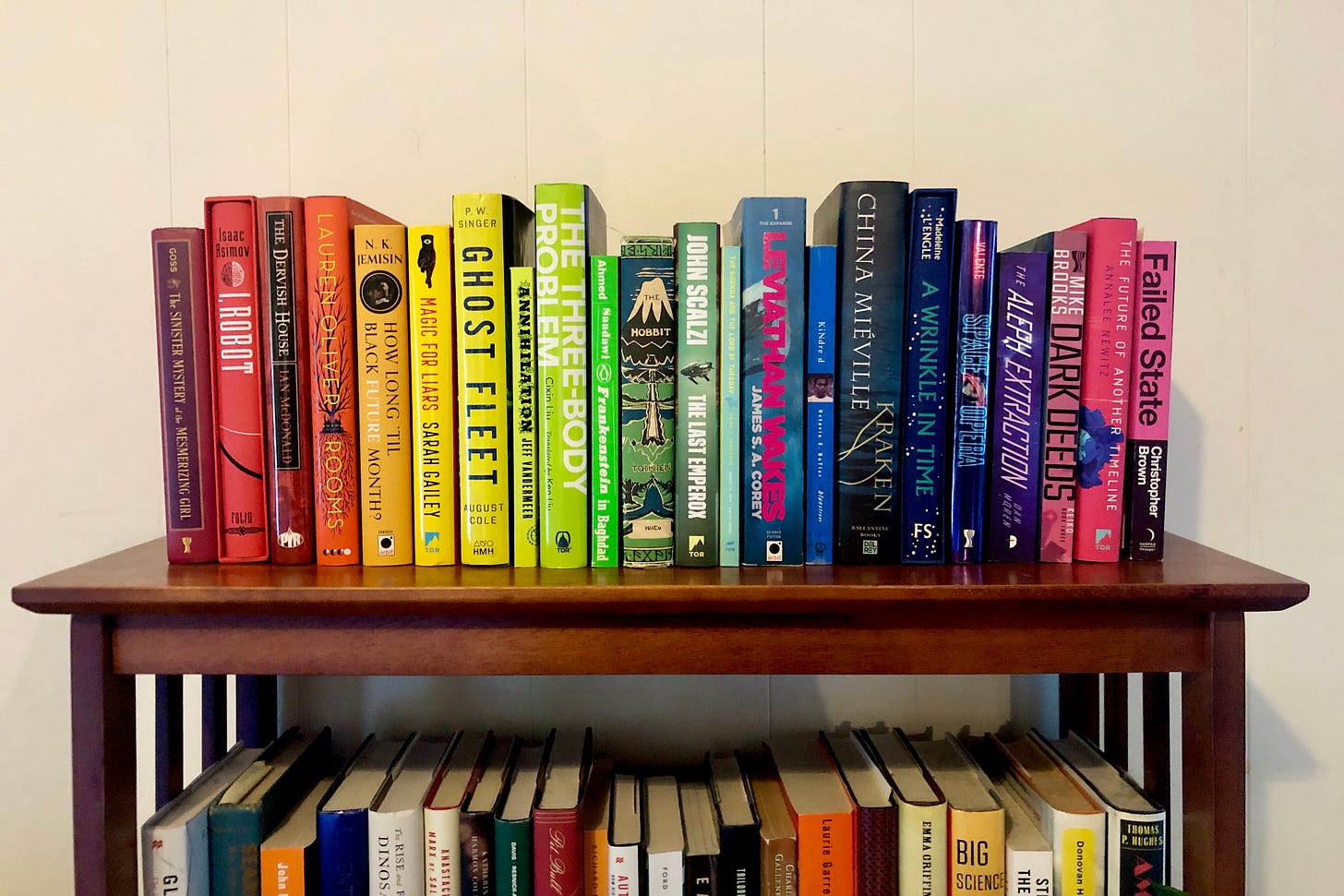Hello!
We’re in the midst of fall here in Vermont — the reds, yellows, and oranges are particularly vivid on the trees and the forest floors. It’s a time of transition, something that’s been on my mind as we barrel into October.
The state of the world — politics, entertainment, SF/F, fandom, etc. — has been on my mind a lot lately, and it’s prompted me to rethink a bit about how I’m approaching this newsletter. I’m making some changes to its focus and mission, and accordingly, I’m giving it a new name: Transfer Orbit.
A New Mission

Image: NASA/Bill Ingalls, photoedited by me
In the summer of 1939, John W. Campbell Jr. took over the reins of Astounding Science Fiction, one of the many pulp magazines churning out the pulp science fiction stories of the age.
At the time, Campbell was working in a time of almost unfathomable change. A World War was brewing, the United States was about to springboard itself into one of the world’s leading powers, and science and technology promised cures for diseases, new ways of doing business, and even that we’d land a man on the Moon.
Campbell, the authors he published, and the other magazines, editors, and fans began to try and think of what the promise of technology would bring to the future. In doing so, he redefined what science fiction was, and set the mold for what we think of as science fiction for decades to come.
In the summer of 2020, science fiction stands at a similar crossroad.
For a couple of months now, I’ve been trying to grapple with the state of the world, and the need for a better sense of direction for how I approach writing. Where does my opinion and view of science fiction and storytelling fit into this reality that we’ve found ourselves in? How are we using stories to come to terms with an increasingly authoritarian and automated world? How do we tell stories to make sense of a changing climate or privatized space travel? How do the stories that we love provide a rickety platform for the stories that we’re telling now?
These are all things that I’ve written about in this newsletter, but this line of thinking has made me realize that it isn’t enough to write reviews and commentary about the past: in order to be relevant, I need to be thinking about what the state of science fiction is in the months, years, and decades to come.
We’re at a significant point of transition in all facets of the genre. The technological world that surrounds us is changing drastically — we live in a world that is science fictional in many ways. The things we’re fans of is changing, and I don’t think that the traditional world of fandom as we know it isn’t really equipped to handle that.
The genre as it originally existed isn’t a thing anymore: a small group of devotees to the same magazines and fanzines and authors who gathered a couple of times a year with their friends and fellow writers at conventions and in magazine letter columns.
I’ve been frustrated by conventions and the types of discussions that I see happening. A discussion about the future of military science fiction turned into its panelists recommending the likes of The Forever War and Starship Troopers — books released decades ago and which aren’t nearly as relevant as newer works that have come amidst the global war on terror. George R.R. Martin’s horrible performance at the Hugo Awards highlighted just how out of touch fandom (as a whole) can be.
But more than that, Fandom feels like a group of people too focused on pedantic labels, definitions, and the narrow subset of books marketed right to them — all features that lead to exclusion and marginalization of authors, works, themes, mediums, and more.
None of this is new, of course: there are a number of great fan writers and commentators out there. We’ve seen how Fandom as a whole is a microcosm for the larger world. Gamer Gate and Sad/Rabid Puppies proved to be a horrifying dress rehearsal for the hellish four years that we’ve been living through. We’ve seen how arguments about the state of major entertainment franchises can cause major ripples throughout fandom all the way up to studio policy.
So.
As Transfer Orbit, I’m going ensure that my focus is squarely on the future of science fiction. This isn’t to say that I won’t dip into the past or occasionally go down some rabbit hole, but I want to make sure that the genre that I’m looking at isn’t tied directly to the 20th Century and its conclusions: I want to use this publication to look around the corner, to see what the genre might be anticipating, and what lessons we can glean from our recent past. I want to better explore how technology is changing storytelling, how we organize, and how real-world events impact the stories we tell, and vice-versa.
More paid posts are coming
With this new focus in mind, not much is really going to change for you.
I’ll still be sending out roundup posts like this one, some book reviews, and longer interviews. But, I’m planning on upping the tempo for paid posts a bit, something I’ve already started doing.
Upfront, I don’t want the free version of this newsletter to feel as though it’s a loss-leader for the paid version: I put thought and work into both, and I hope that readers of all stripes feel that they’re getting some value from it, whether it’s the occasional review, roundup, or book list.
If you want a taste of what’s been going on on the paid side here, here’s a short roundup of what I’ve been writing about:

The Technological Landscape: an essay about the landscape and how our presence leaves a lasting footprint for future generations. (plus some pretty pictures!)
Liu Cixin's Three-Body Problem is coming to Netflix: My initial reaction to the news that Netflix is adapting The Three-Body Problem, what is means for Netflix, Chinese SF, and the streaming world in general.
Online bookselling in the time of COVID: A report about Bookshop.org, an independent bookselling platform, several months into its life thus far. Positioned as an indie competitor to Amazon’s dominance, I spoke with CEO Andy Hunter about some of the challenges that they’ve had and where they’re headed next.
Interview with Mary Robinette Kowal (Audio): I interviewed Mary Robinette Kowal a while back ahead of the release of her book The Relentless Moon, and cleaned up the audio. It was a fun interview to read, and it’s even better to listen to.

Cover Art: This was a lot of fun to write up and photograph, particularly that rainbow image. This is a look into how I see cover art and photograph books for reviews, Twitter, and elsewhere. Again, lots of pretty pictures.
Three-Body Geopolitics: After Netflix announced its Three-Body Problem adaptation, a couple of lines from an interview that Liu Cixin posed surfaced of him voicing his support for the Chinese government over the treatment of Uyghurs. It’s not a good development, but I think that it’s not quite as cut-and-dry as it seems.
Moving forward, my approach to paid posts is going to be a mix of evergreen newsletters (stuff that’s not necessarily tied to the newscycle, like Cover Art and Technological Landscape), and a bit more of an in-depth focus on the happenings of the SF/F world (like developments with the Three-Body Problem or J.K. Rowling.)

Posts that I’ve got lined up or in the works? A new “What’s in my Bag” feature (sending this out next week!), a deep dive into how fandom isn’t immune to conspiracy theories and radicalization, an essay about horror and how the boundary between humanity and nature is prime territory for monsters, a feature about how a US military institution started work on a wargame against an AI-equipped adversary, and a couple of others. Plus, podcast! New Worlds is coming soon.
So, if any of that is of interest, please consider signing up as a paid subscriber — there’s plenty more to come in the month ahead. If that’s not in the cards? Please consider sharing it on Facebook/Twitter/Forwarding it to friends, etc. — I’ve found that word of mouth is the best way to get this sort of thing before potential readers.
Currently Reading
I finally finished a book! I blew through The Invisible Life of Addie LaRue by V.E. Schwab, and really enjoyed it. It’s a heartbreaking, emotional book about a faustian deal, and the cost of human interaction (or lack thereof.) It hits stores soon, and I definitely think you’ll be hearing more about it.
Up next? I’m finally getting through Paul Tremblay’s Survivor Song, and I’ve picked up Rebecca Roanhorse’s Black Sun. I’m enjoying both quite a bit. And of course, I’m working on finishing up Dune.
As noted in my October book list, this is a packed month, and a lot of the books that I’ve been looking forward to are on my to-read list now. The Once and Future Witches by Alix E. Harrow, The Ministry for the Future by Kim Stanley Robinson, and Ring Shout by P. Djèlí Clark. But there’s also those surprises that look cool that you don’t discover until it randomly pops up on a Twitter post, like Pantheon by K.R. Paul.
Further Reading
Charlie Jane’s Book of Writing Advice. Charlie Jane Anders (friend and former editor and boss at io9) has been writing a regular column on Tor.com about writing advice — she’s announced that she’s compiling them into a book. I’ve loved her writing advice over the years, and I’ve said many times that it would be great to see it compiled in one volume. This’ll be a must-buy.
COVID-ready costumes. Over on Cosplay Central, I wrote up a list of costumes to wear when conventions are finally a thing again.
Cuban SF. Cuban science fiction author Yoss (who’s written some pretty interesting SF novels) wrote about Miguel Collazo’s novel The Journey, and where it fits in the island’s history of science fiction.
Hogwart’s Legacy. J.K. Rowling has been digging herself deeper and deeper into a hole with her remarks about trans people. Over on Polygon, Stacey Henley writes about why she won’t be playing the upcoming open-world game Hogwarts Legacy.
Pretty Dune. The Folio Society is releasing a special collector’s edition of Frank Herbert’s Dune. Grabby hands.
Realism in SF/F Debate. Lincoln Michel talks about the role that “realism” plays in SF/F, and how it’s something that we probably shouldn’t get too hung up on.
To The Bat-Phones! Back in July, I wrote about how Spotify was partnering up with DC Comics for a series of podcasts. Well, the streaming service just announced its first series, which will come from David Goyer and will be about Batman.
Toxic Publishing. Over in Vanity Fair, Keziah Weir takes a deep look into the culture at Skyhorse Publishing, a rising indie publisher that’s snapped up some big names (including Night Shade Books, which had its own issues years ago).
That’s all for now. Let me know what you think of the changes to the letter, and what you’d most be interested in hearing about. I’ve love to hear if you have tips about stories, things that you’re seeing in the genre, or suggestions in general. Leave a comment or shoot me an email directly.
In the meantime, my copy of Star Wars Squadrons literally just hit my doorstep, so I know what I’m doing this afternoon.
Andrew




I’m intrigued by this deliberate forward looking approach as pertains to technology and SciFi and eager to see how it plays out.
Given your education, persuing the history of sf/f was a natural impulse, and a joy for us to read. I'm excited to see what your analysis of today's offerings predicts for the future of the genres.
Also, sometimes we can shape the future by predicting it persuasively.
*evil laugh*